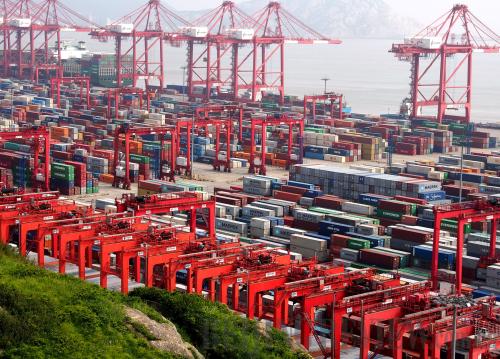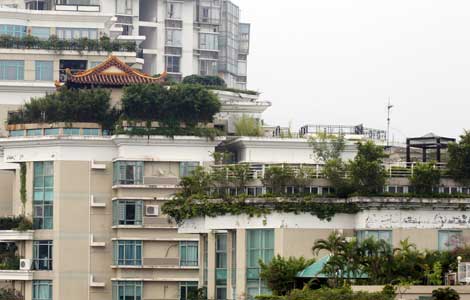A new growth engine
Updated: 2013-09-02 18:02
(bjreview.com.cn)
|
||||||||
|
 Ship it to Shanghai: Containers are densely laid out at the Yangshan Free Trade Port Area in Shanghai [Photo / bjreview.com.cn]
|
The Central Government has given Shanghai the green light to set up the mainland's first free trade zone, moving it closer to becoming a global financial, trade and shipping hub to rival other Asian cities such as Hong Kong. The pilot free trade zone will serve as a new growth engine amid an economic slowdown and sluggish foreign trade.
The most valued function of the zone is serving as a testing ground for China to roll out major financial reforms as experience gained from the pilot zone will be copied to other regions of the country. Questions remain as to whether Shanghai might challenge Hong Kong's status as an offshore yuan trading center after the establishment of the zone. Experts also warn of possible risks the pilot zone may face in the future.
The State Council has approved the establishment of a pilot free trade zone in east China's Shanghai, according to a Ministry of Commerce statement on August 22. The project, covering an area of 28.78 square km, will be built on the basis of Shanghai's existing bonded zones—Waigaoqiao Free Trade Zone, Waigaoqiao Free Trade Logistics Park, Yangshan Free Trade Port Area and Pudong Airport Comprehensive Free Trade Zone—and will take more than 10 years to complete.
A free trade zone is a place where goods can be imported, manufactured and exported without the intervention of customs authorities. Upon completion, the Shanghai Free Trade Zone will provide, officials say, world-class transport and communications facilities and a tax-free environment for domestic and foreign enterprises as a major hub of their supply chains in Asia.
A general plan governing the operation of the free trade zone has yet to be released. Lawmakers need to approve amendments to existing laws to legalize certain experiments in the zone, read the MOFCOM statement.
The pilot zone is a crucial move in adapting to global economic and trade development and imposing a more proactive opening-up strategy, said the statement, adding it will help explore a new path for China's opening up and promote the country's economic restructuring as it seeks new modes of growth. The zone will help foster China's global competitiveness and serve as a new platform for its cooperation with other countries, and help build an upgraded economy.
Significance
"China's decision to set up a free trade zone in Shanghai comes at a time when the country is facing great challenges from home and abroad," said Chen Bo, an economic and trade expert with the Shanghai University of Finance and Economics.
China's foreign trade only increased 6.2 percent in 2012, the slowest since 2008, hinting what could be a long-term slow growth period. The country needs a new engine to invigorate a slowing economy amid domestic and foreign challenges, he said.
Ye Tan, a renowned financial commentator, agreed. "The policy dividend of WTO entry has been somewhat used up. China needs a new system to release more dividends and a free trade zone makes the most sense, because it would not only facilitate exports, but also attract foreign investment," she said.
Experts say the pilot free trade zone is of particular significance to China's industrial restructuring, which calls for the modernization of its supply chain management with an emphasis on logistics.
Under the background of globalization, the Shanghai free trade zone will not only lift foreign trade, but also intensify the inflow of production factors to support China's future development in the next 30 years, say analysts.
Shen Guilong, a professor of economics at the Shanghai Academy of Social Sciences, said the zone is a breakthrough for Shanghai's rapid economic development. Shen says the zone will attract more global companies, especially from the service sector, to launch their Asia-Pacific offices or China headquarters in the city. The zone is expected to offer more complete, convenient and transparent foreign trade services, including customs clearance and supervision policies, he adds.
Liu Shengjun, Deputy Director of CEIBS Lujiazui International Finance Research Center, hailed the free trade zone as an historic breakthrough since China's WTO entry in 2001. "China completed the first phase of globalization by joining the WTO and will launch the second phase by setting up the Shanghai free trade zone, which is designed to reduce trade barriers and expand opening up."
The Central Government has targeted Shanghai as a global financial, trade, shipping and logistics center, so it's no surprise the free trade zone will be situated there. Shanghai, a city of over 20 million people, is already the world's largest container port city and a major transportation hub in China and the region.
Most Viewed
Editor's Picks

|

|

|

|

|

|
Today's Top News
Banks rake in profits
Automakers look to drive sales overseas
Trading error dims Everbright's prospects
Li sees opportunities despite dispute
Home prices keep rising in August
Xi's planned visit to Turkmenistan lauded
Beijing to consider fees for car congestion
VP urges cooperation with Eurasia
US Weekly

|

|














